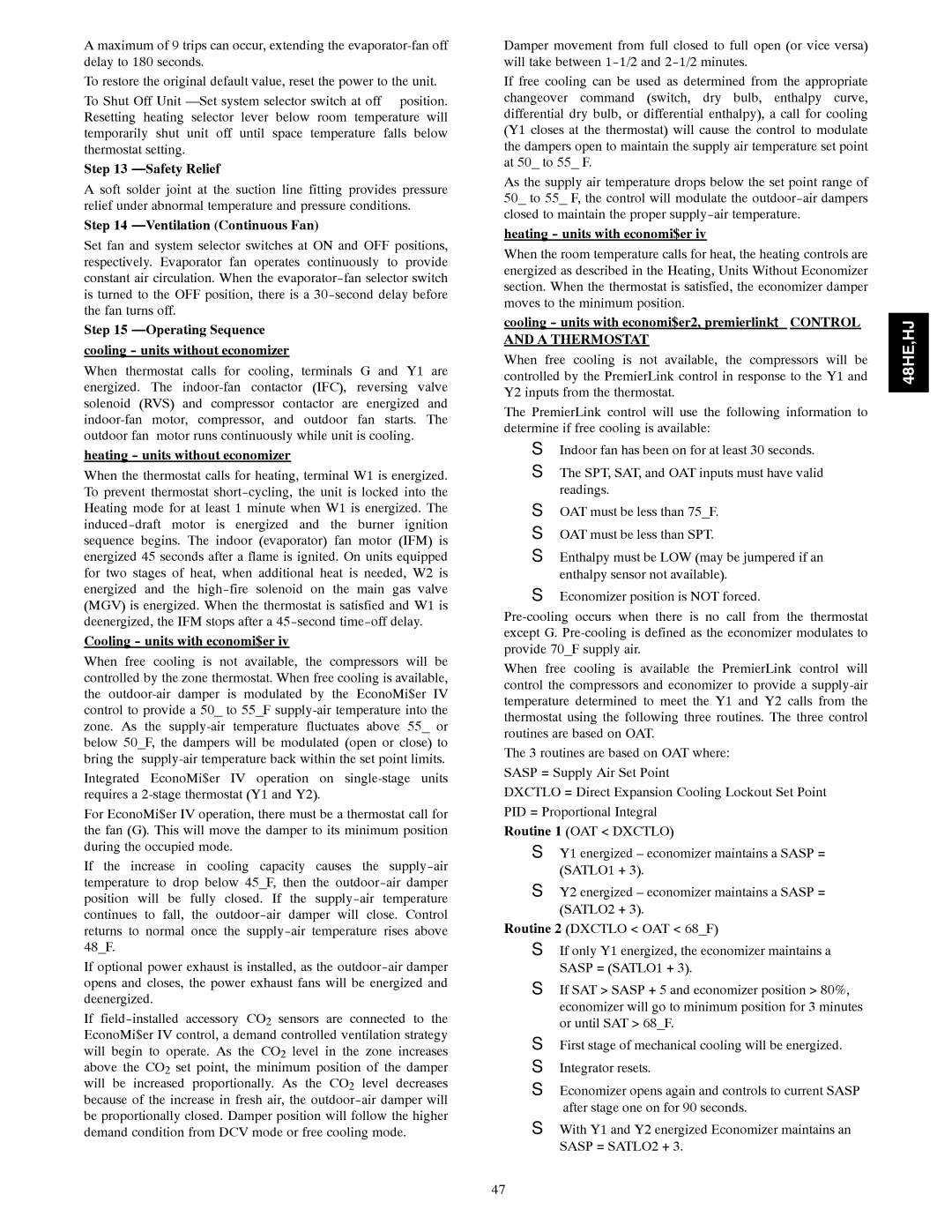A maximum of 9 trips can occur, extending the evaporator-fan off delay to 180 seconds.
To restore the original default value, reset the power to the unit.
To Shut Off Unit —Set system selector switch at off position. Resetting heating selector lever below room temperature will temporarily shut unit off until space temperature falls below thermostat setting.
Step 13 —Safety Relief
A soft solder joint at the suction line fitting provides pressure relief under abnormal temperature and pressure conditions.
Step 14 —Ventilation (Continuous Fan)
Set fan and system selector switches at ON and OFF positions, respectively. Evaporator fan operates continuously to provide constant air circulation. When the evaporator-fan selector switch is turned to the OFF position, there is a 30-second delay before the fan turns off.
Step 15 —Operating Sequence
cooling - units without economizer
When thermostat calls for cooling, terminals G and Y1 are energized. The indoor-fan contactor (IFC), reversing valve solenoid (RVS) and compressor contactor are energized and indoor-fan motor, compressor, and outdoor fan starts. The outdoor fan motor runs continuously while unit is cooling.
heating - units without economizer
When the thermostat calls for heating, terminal W1 is energized. To prevent thermostat short-cycling, the unit is locked into the Heating mode for at least 1 minute when W1 is energized. The induced-draft motor is energized and the burner ignition sequence begins. The indoor (evaporator) fan motor (IFM) is energized 45 seconds after a flame is ignited. On units equipped for two stages of heat, when additional heat is needed, W2 is energized and the high-fire solenoid on the main gas valve (MGV) is energized. When the thermostat is satisfied and W1 is deenergized, the IFM stops after a 45-second time-off delay.
Cooling - units with economi$er iv
When free cooling is not available, the compressors will be controlled by the zone thermostat. When free cooling is available, the outdoor-air damper is modulated by the EconoMi$er IV control to provide a 50_ to 55_F supply-air temperature into the zone. As the supply-air temperature fluctuates above 55_ or below 50_F, the dampers will be modulated (open or close) to bring the supply-air temperature back within the set point limits.
Integrated EconoMi$er IV operation on single-stage units requires a 2-stage thermostat (Y1 and Y2).
For EconoMi$er IV operation, there must be a thermostat call for the fan (G). This will move the damper to its minimum position during the occupied mode.
If the increase in cooling capacity causes the supply-air temperature to drop below 45_F, then the outdoor-air damper position will be fully closed. If the supply-air temperature continues to fall, the outdoor-air damper will close. Control returns to normal once the supply-air temperature rises above 48_F.
If optional power exhaust is installed, as the outdoor-air damper opens and closes, the power exhaust fans will be energized and deenergized.
If field-installed accessory CO2 sensors are connected to the EconoMi$er IV control, a demand controlled ventilation strategy will begin to operate. As the CO2 level in the zone increases above the CO2 set point, the minimum position of the damper will be increased proportionally. As the CO2 level decreases because of the increase in fresh air, the outdoor-air damper will be proportionally closed. Damper position will follow the higher demand condition from DCV mode or free cooling mode.
Damper movement from full closed to full open (or vice versa) will take between 1-1/2 and 2-1/2 minutes.
If free cooling can be used as determined from the appropriate changeover command (switch, dry bulb, enthalpy curve, differential dry bulb, or differential enthalpy), a call for cooling (Y1 closes at the thermostat) will cause the control to modulate the dampers open to maintain the supply air temperature set point at 50_ to 55_ F.
As the supply air temperature drops below the set point range of 50_ to 55_ F, the control will modulate the outdoor-air dampers closed to maintain the proper supply-air temperature.
heating - units with economi$er iv
When the room temperature calls for heat, the heating controls are energized as described in the Heating, Units Without Economizer section. When the thermostat is satisfied, the economizer damper moves to the minimum position.
cooling - units with economi$er2, premierlinkt CONTROL AND A THERMOSTAT
When free cooling is not available, the compressors will be controlled by the PremierLink control in response to the Y1 and Y2 inputs from the thermostat.
The PremierLink control will use the following information to determine if free cooling is available:
SIndoor fan has been on for at least 30 seconds.
SThe SPT, SAT, and OAT inputs must have valid readings.
SOAT must be less than 75_F. S OAT must be less than SPT.
SEnthalpy must be LOW (may be jumpered if an enthalpy sensor not available).
SEconomizer position is NOT forced.
Pre-cooling occurs when there is no call from the thermostat except G. Pre-cooling is defined as the economizer modulates to provide 70_F supply air.
When free cooling is available the PremierLink control will control the compressors and economizer to provide a supply-air temperature determined to meet the Y1 and Y2 calls from the thermostat using the following three routines. The three control routines are based on OAT.
The 3 routines are based on OAT where: SASP = Supply Air Set Point
DXCTLO = Direct Expansion Cooling Lockout Set Point PID = Proportional Integral
Routine 1 (OAT < DXCTLO)
SY1 energized – economizer maintains a SASP = (SATLO1 + 3).
SY2 energized – economizer maintains a SASP = (SATLO2 + 3).
Routine 2 (DXCTLO < OAT < 68_F)
SIf only Y1 energized, the economizer maintains a SASP = (SATLO1 + 3).
SIf SAT > SASP + 5 and economizer position > 80%, economizer will go to minimum position for 3 minutes or until SAT > 68_F.
SFirst stage of mechanical cooling will be energized. S Integrator resets.
SEconomizer opens again and controls to current SASP after stage one on for 90 seconds.
SWith Y1 and Y2 energized Economizer maintains an SASP = SATLO2 + 3.
